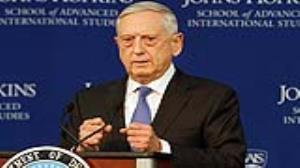Number two is how do you field, in the modern age, a decisive conventional force? It's expensive. We recognize that. But it's less expensive than fighting a war with somebody who thought that we were weak enough that they could take advantage.
And the third is, at the same time as we field that conventional force, how do you sustain a counterinsurgency capability inside your force? And why do I say that? I go back to the words of the most near-faultless strategist alive today, Dr. Colin Gray of Reading University, who said, "The paradox of war being" -- and I said it in my -- in my prepared remarks -- "that the enemy will always move against your perceived weakness, we cannot marry adopt one preclusive form of warfare" -- say we're not going to do counterinsurgency, because you know what's going to happen.
And so we are going to have to do it -- I see it as a -- it is, relatively, a training and education issue. It doesn't take a lot of specialized kit -- there's some -- but it takes language skills. It takes young men and women who want to join up and serve their country who have studied other nations, who speak the language. It takes not just cultural appreciation, but it takes the kind of training that puts an awful lot of authority in the hands of 20-year-old corporals and 24-year-old, 23-year-old second lieutenants.
Now, those forces, in that labor-intensive kind of warfare, scatter among innocent people. And we fight those wars so obviously among the innocent that it takes a very well-trained, well-honed force.
But it's mostly training and it's mostly education that allows us to keep counterinsurgency inside the great power competition force that we are composing.
|

